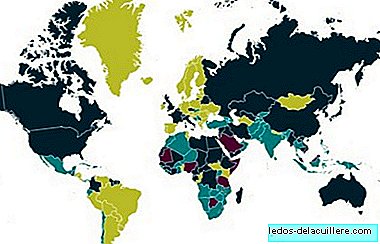
Corporal punishment constitutes the most common form of violence against children worldwide. They are defined as any type of punishment in which physical force is used with the intention of causing some degree of pain or discomfort, even if it is light, as well as any type of non-physical punishment that is cruel and degrading.
France has just finally approved by law the prohibition of physical punishment of children, becoming the 56th country in the world that joins this prohibition. These are the other 55 countries that do, list to which the rest of the countries are expected to be added.
End Corporal Punishment, the Global Initiative to end corporal punishment of children, collects detailed data on the legality in each country and functions as a catalyst to promote progress in the elimination and universal prohibition of all corporal punishment of children.
The 56 countries in the world that prohibit punishment for children
The countries that currently have a total ban in all environments (home, school, public places ...), and since when are they:
- Sweden: since 1979
- Finland: since 1983
- Norway: since 1987
- Austria: since 1989
- Cyprus: since 1994
- Denmark: since 1997
- Latvia: since 1998
- Croatia: since 1999
- Germany, Israel, Bulgaria: since 2000
- Turkmenistan: since 2002
- Iceland: since 2003
- Romania, Ukraine: since 2004
- Hungary: since 2005
- Greece: since 2006
- Togo, Spain, Venezuela, Uruguay, Portugal, New Zealand, The Netherlands: since 2007
- Liechtenstein, Luxembourg, Republic of Moldova, Costa Rica: since 2008
- Albania, Congo (Republic of), Kenya, Tunisia, Poland: since 2010
- South Sudan: since 2011
- Cape Verde, Honduras, North Macedonia: since 2013
- Andorra, Estonia, Nicaragua, San Marino, Argentina, Bolivia, Brazil, Malta: since 2014
- Benin, Ireland, Peru: since 2015
- Mongolia, Montenegro, Paraguay, Slovenia: since 2016
- Lithuania: since 2017
- Nepal: since 2018
- Kosovo: since 2019
- France: since 2019
Further, 56 more states have pledged to reform their laws to achieve a complete legal ban.
Total, 32 of the 47 member states of the Council of Europe have banned explicitly corporal punishment against minors, but they are still allowed in the other 15 countries. On the other hand, there are nine Latin American countries that specifically prohibit corporal punishment of children.
There is still much to be done
 Number of states in the world that prohibit physical punishment by law in each area (Source: Global Initiative to end all corporal punishment in children)
Number of states in the world that prohibit physical punishment by law in each area (Source: Global Initiative to end all corporal punishment in children) Although every year there is more progress towards global prohibition, there is still a long way to go, since there are still many countries that do not prohibit corporal punishment of children or, worse still explicitly authorize their use and establish details of how it should be inflicted.
Let's see some data:
- Only 10% of the world's children They are fully protected by law from all corporal punishment.
- The governments of 92 states have not yet committed publicly with legal reform.
- In 67 states, corporal punishment has not been totally prohibited in schools.
- In 32 states, corporal punishment remains legal under state, traditional and / or religious law as a sentence for crimes committed by minors.
- In 17 states, corporal punishment is not totally prohibited In any environment.
Corporal punishment in Spain

In Spain, since the revision of the Civil Code of 2007, reasonable or moderate physical punishment is prohibited, that is, hitting children is a crime. These sanctions were included in articles 154 and 268 of the said code.
The Penal Code, in its article 153 explicitly sanctions all types of domestic violence against children with "imprisonment from six months to one year or work for the benefit of the community".
However, it is not entirely blunt. The law also provides that parents, in justified cases, can exercise their right of correction.
"The parents may, in the exercise of their function, seek the help of the authority."












